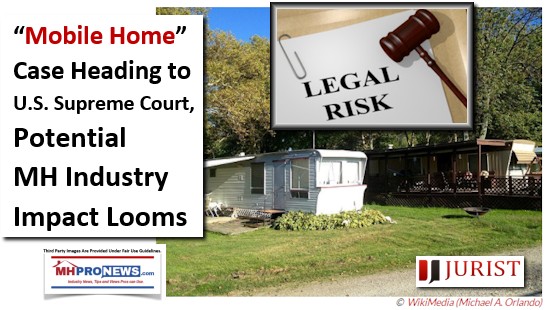
“The US Supreme Court granted certiorari Monday in two cases dealing with the question of whether breaking into a mobile home or other “nonpermanent or mobile structure” constitutes a burglary under the Armed Career Criminal Act (ACCA), consolidating them for oral argument,” said Jurist in a report picked up and confirmed by the Daily Business News.
“The ACCA provides that people who have been convicted of “violent felonies” (including burglary) or serious drug offenses at least three times will be sentenced to a mandatory minimum of 15 years if they are found possessing or transporting a firearm,” per Jurist’s report, linked above.
The Jurist website says it is a “Legal News & Research University of Pittsburgh School of Law,” based in Pittsburgh, PA.
In a brief statement to MHProNews, Jurist said that they were not sure if the case involved was a a true mobile home or a manufactured home. Their selection of the photo shown above was therefore not meant to suggest the kind of structure involved, as either a pre-or-post HUD code home.
Two Legal Insights of the Case, One from Within MH, One Outside Looking In
The question presented to the Supreme Court in both cases is whether “burglary of a nonpermanent or mobile structure that is adapted or used for overnight accommodation can qualify as ‘burglary’ under the Armed Career Criminal Act of 1984,” said a legal source to MHProNews that requested anonymity. That source said, “I don’t know whether the structures in question are true mobile homes or not.”
The source is from outside of the industry, and was asked if the Manufactured Housing Institute (MHI), or other industry connected attorneys or associations had filed an amicus brief?
As of late Wednesday afternoon, the answer was “no.”
That same source said, “I also don’t know if the distinction between true mobile homes and manufactured structures is going to be germane to the Court’s consideration. However, to the extent that you can’t necessarily move a manufactured home and they don’t dissolve in the rain or anything, I would think that the fact that the Court’s considering the contours of a “nonpermanent or mobile structure” would rule out most manufactured homes. I would guess that most MH are both permanent and immobile.”
“The petitions for certiorari (Stitt and Sims) should have more details about the facts of the case,” the source stated, adding, “Failing that, Court Listener should have all of the documents from the trial court (Stitt and Sims).”
An industry attorney told the Daily Business News reasons why this case could become significant to the industry, if it isn’t properly addressed.
“While this case involves a criminal statute that is not directly related to the definition of “manufactured home” as set forth in the statutes governing the federal regulation of the industry, there is always the possibility that a court, in a case like this, involving the construction of a federal statute, could look to our law in an effort to resolve the question before it. And that, in turn, could lead to a misconstruction or other problematic statement by the court that could later be turned around and asserted in a case involving our law, or, even worse, used in a way that fails to provide manufactured housing residents with the same type or degree of criminal law protections that are afforded other homeowners or residents. The potential impact of such a discriminatory outcome — in this case – on the industry’s post-production sector, and the need for an amicus (“friend of the court”) brief addressing this issue, further illustrates the necessity of independent, national, collective representation for the industry’s post-production sector,” said Mark Weiss, J.D., President and CEO of the Manufactured Housing Association for Regulatory Reform.
The industry’s self-proclaimed post-production sector has been represented for decades by the Arlington, VA based Manufactured Housing Institute (MHI).
In a video comment to MHProNews, former MHI Chairman Nathan Smith said that the industry must be honest with itself, and admit that it had often failed to be proactive (see video below).
The question is, will MHI roll-the-dice and not issue a press release that clarifies the issues, accompanied by an amicus brief to the high court? Or will MHI do both issue a clarifying release and file an amicus brief, and thus protect the industry from a risk that could be avoided if acted upon now?
Time will tell. “We Provide, You Decide.” © ## (News, analysis, and commentary.)
NOTICE: Exclusives from HUD, and Attendees about Secretary Carson’s comments at MHI will be part of an upcoming report. Sign up for our emailed news updates for that notice, and to stay up with all of the industry’s most popular, best and most independent fact-based converge.
(Third party images are provided under fair use guidelines.)

1) To sign up in seconds for our MH Industry leading emailed news updates, click here.
2) To provide a News Tips and/or Commentary, click the link to the left. Please note if comments are on-or-off the record, thank you.
3) Marketing, Web, Video, Consulting, Recruiting and Training Resources

Soheyla is a managing member of LifeStyle Factory Homes, LLC, the parent company to MHProNews, and MHLivingNews.com.

























